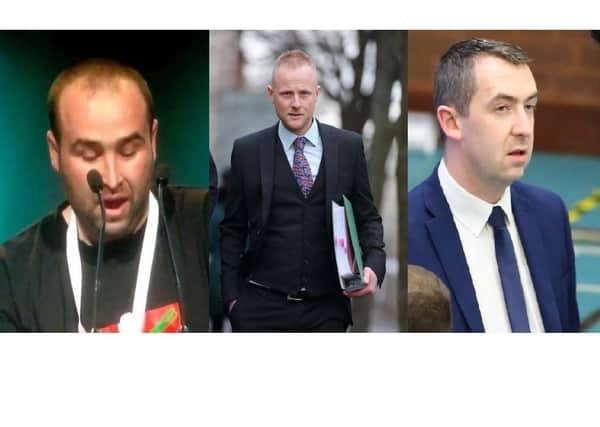Jamie Bryson, Daithi McKay and Thomas O’Hara fail in bid to have Nama case charges thrown out by court


The judge also rejected an attempt by Mr Bryson – which was supported by lawyers for the other defendants – to impose reporting restrictions on the judgment.
However, District Judge Mark McGarrity stressed that his judgment should be understood by the public to only mean that there is sufficient evidence against the three men for them to face a criminal trial and that he was not ruling on their guilt or innocence.
Advertisement
Hide AdAdvertisement
Hide AdYesterday’s ruling followed four days of hearings at Downpatrick Magistrates Court as part a preliminary investigation of the evidence, with the defendants attempting to have the case thrown out before trial – something which would be very unusual at this stage of a case.
Mr Bryson, who is representing himself, had in 2015 alleged in evidence to a Stormont committee hearing that there was corruption around the sale of Nama’s £1.1 billion Northern Ireland property portfolio. Under Assembly privilege, he claimed that First Minister Peter Robinson stood to benefit from £7m moved to an offshore bank account as part of the deal.
Mr Robinson immediately rebutted that, saying he was never offered “a single penny”.
It subsequently emerged that there had been prior contact between the loyalist and Mr McKay, the committee chairman, some of it through Mr O’Hara.
Advertisement
Hide AdAdvertisement
Hide AdThe judge said that the evidence heard by the court “reveals or allows for the following inferences...messages were exchanged between Mr Bryson and Mr McKay and Mr Bryson and Mr O’Hara; the messages were derived [by police] from two sources – Mr O’Hara himself, and Mr Samuel Morrison, who averred that he received an email containing the messages from a person he believed to be Jamie Bryson following their conversations about the MLA code of conduct and the work of the relevant committee.”
He said the messages reveal contact between Mr Bryson and Mr McKay from September 2, 2015.
The judge said that the messages then moved to Mr McKay advising the future witness as to how his evidence could be heard in public session and then asked Mr Bryson to communicate with Mr O’Hara.
The judge went on: “Subsequent messages advised Mr Bryson how to word his evidence so that certain aspects that are not within the terms of reference can be incorporated into his evidence about his presentation...and what to say in order to achieve this, how to avoid members of the committee finding reason to go into private session, the wording and structure of an opening statement to improve the opportunity to mention potentially objectionable material without challenge from committee members...”
Advertisement
Hide AdAdvertisement
Hide AdThe judge said that “the aim of the communications between the defendants was to frustrate the intentions of the committee or some members thereof on management of committee business and to eliminate as much as possible opportunities for members of the committee to object to all or parts of Mr Bryson’s evidence being given in open session”.
However, the judge said that there were “no rules or guidelines governing whether or not a member of the committee could have contact with a witness who was to be called to give evidence”.
He said that during the committee hearing Mr McKay “interacted with Mr Bryson in a manner that gave a false picture as to the then relationship between them...Mr McKay’s conduct was incompatible with the proper discharge of the responsibilities of the office”.
The judge said he could only throw out the case if there was no prospect of it leading to conviction, and that was not the case in this instance.
Advertisement
Hide AdAdvertisement
Hide AdMr Bryson then made an application to prohibit publication of the judge’s ruling, arguing that reporting of it could prejudice a jury which may hear the case.
However, after significant legal argument in which the other defence lawyers supported Mr Bryson’s applications, the judge ruled that was not necessary and said he had to assume that the judgment would be reported appropriately with the caveat that there was no finding of guilt and that all he had said was that there was sufficient evidence to go to trial.
The three defendants were returned for trial at Belfast Crown Court.
READ MORE:
Advertisement
Hide AdAdvertisement
Hide AdAdvertisement
Hide AdAdvertisement
Hide AdAdvertisement
Hide AdAdvertisement
Hide Ad——— ———
A message from the Editor:
Thank you for reading this story on our website. While I have your attention, I also have an important request to make of you.
With the coronavirus lockdown having a major impact on many of our advertisers — and consequently the revenue we receive — we are more reliant than ever on you taking out a digital subscription.
Advertisement
Hide AdAdvertisement
Hide AdSubscribe to newsletter.co.uk and enjoy unlimited access to the best Northern Ireland and UK news and information online and on our app. With a digital subscription, you can read more than 5 articles, see fewer ads, enjoy faster load times, and get access to exclusive newsletters and content. Visit https://www.newsletter.co.uk/subscriptions now to sign up.
Our journalism costs money and we rely on advertising, print and digital revenues to help to support them. By supporting us, we are able to support you in providing trusted, fact-checked content for this website.
Alistair Bushe
Editor